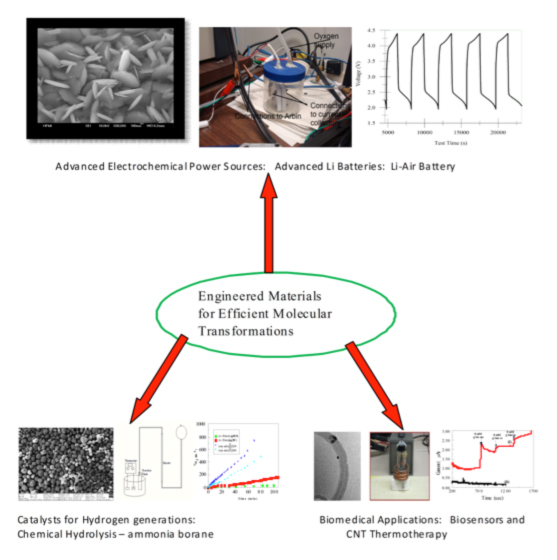Dr. E. Eric Kalu
Professor
FAMU-FSU College of Engineering
Research Overview
Dr. Kalu and members of his research group are interested in the synthesis of materials for their performance applications. They are involved in basic engineering research that addresses fundamental issues and challenges affecting materials in the areas of electrochemical and solar power sources, biomass derived fuels, thin films, waste recovery/treatment and biomaterials. We aim to understand the physics and chemistry at molecular level (nanoparticles) that guide and influence the behavior of materials. By exploring such fundamental issues, we hope to contribute to the general understanding of methods of assembling materials through "bottom-up" approach rather than current 'top-down" method. Current research interests include:
Nanomaterials for Bio-inspired Processes: Fuel, Biomedical & Environmental Issues
- Electrofuels: The recycling of carbon dioxide (CO2) and reduction of its impact and effect as a greenhouse gas is highly desirable. The research aims to develop a bio-inspired system capable of reducing carbon dioxide to a useable fuel (such as butanol or methanol) at a minimal energy cost. The design of modified electrode with enzyme cascade and investigation of optimal reaction conditions to achieve optimal conversion of CO2 into fuels is of interest.
- Nanostructured Materials for Biomedical Applications: We are pursuing the development of rational methods for synthetic nano-thermochemical nanomaterials for medical applications including magnetic materials for thermotherapy and contrast agents for MRI. Also, investigation in bio-electrochemistry is pursued through research on biosensor based on enzyme immobilization on nanostructured materials. The fabrication and characterization (including analytical performance characterization) of a glucose biosensor based on polymer stabilized metal nanoparticle is of interest. We are investigating physical adsorption and co-deposition (electrodeposition and electroless methods) of metal nanoparticles and glucose oxidase (GOx) onto a carbon electrode for biosensor quantification of glucose.
- Environmental Processes: Environmental catalysis and electrocatalysis for the treatment of contaminated media with the objective of waste minimization and generation/recycle of useful products for sustainability is of area of our research interest. Investigation of the influence of support type on the nanocluster performance, mechanism of dehalogenation for composite nanoclusters and relation between synthesis condition and nanocluster performance are being investigated. Environmental bioelectrochemistry for hydrogen generation from waste water is an example of environmental electrocatalysis of interest. Collaborations across multidisciplinary areas including chemistry, biology, pharmacy etc are pursued.
Advanced Electrochemical Power Sources
- Advanced Lithium Batteries:
Electrochemical power sources based on oxygen from air as the cathode material have the highest theoretical energy density and the example of Li-Air has captured the most recent imagination and interest in the literature. The research challenges that need to be addressed for the Li-Air battery are both fundamental electrochemical/chemical (electrocatalysis, two-phase interfaces, transport) and materials science issues (cathodes, electrolytes and separators). Our effort is guided by careful fundamental electrochemistry in the development and design of electrocatalysts, air cathodes or electrolyte systems for the lithium-based battery. Similarly, our investigation of the electrochemical and transport issues (oxygen, lithium oxide/peroxide, lithium ion) and development of solution approach is guided by core chemical engineering principles. - Fuel Cells and Supercapacitors:
We seek to establish fundamental principles governing electrocatalytic activity of some non-noble metal-oxides that are co-deposited with metalloids. This is done through modeling, correlation of the surface composition and electronic structure to electrocatalytic activity. We aim to develop methods for the directed synthesis and assembly of composite-metallic-metalloid nanoparticles into well-defined geometries and controlled particle size and shape for the electrocatalysis of: (i) oxygen reduction in Direct methanol Fuel cell (DMFC) and Proton Exchange Membrane Fuel Cell (PEMFC) (ii) Direct Liquid Fuels Cells (DLFC) - including direct ammonia borane fuel cell (DABFC), direct hydrazine fuel cell (DHFC), direct borohydride fuel cell (DBFC), direct methanol fuel cell (DMFC) etc. The use of such catalysts for anodic oxidation in the DLFC is component part of our research interest. The synthesis and characterization of nano-composite electrode materials for both oxygen reduction and direct liquid fuel oxidation are important problems for the future applications of fuel cells in energy storage or even automobile applications. The role of metalloids (P, B or S) in non-noble metal oxide composites for oxygen and liquid fuels electrocatalysis is of interest. Mathematical modeling is extensively in our research work – from nanoscale level to macroscale. Hence, development of mathematical models to aid our understanding of the physics of fuel cell processes and its design constitute part of our research interest. High performance supercapacitors with high specific capacitance and high rate capability are being investigated through research on binder-free electrode design and development.
Catalysts for hydrogen generation from liquid fuels
- Chemical Hydrides (Hydrolysis and Methanolysis):
Interest in the development of low-cost catalyst for hydrolysis and methanolysis of ammonia borane, sodium borohydride and other type of hydrides are of interest. Issues to be addressed include optimal catalyst and reactor design and recycle of byproducts. - Electrochemical Hydrogen Generation:
Electrocatalysis of direct hydrogen generation from chemical hydrides, alcohols (bio-fuels) and alkaline systems are areas of interest. This is direct electrolysis of liquid fuels to generate clean hydrogen that can be used directly as fuels for fuel cells or otherwise. Our research interest includes fundamental understanding of electrocatalysis of liquid fuel hydrides (e.g. methanol, glycerol, ammonia borane, sodium borohydride), electrolysis, relationship between synthesis and electrocatalyst activity, selectivity, and durability; and the relationship between electrocatalyst composition, structure and performance. - Steam Reforming: Steam reforming and oxidative steam reforming of gasoline, liquid alcohols for hydrogen generation depend on the development of efficient catalysts that have high selectivity for hydrogen but low selectivity for unwanted reactant products especially carbon monoxide, CO. We are interested in using polymer-stabilized metal catalysts and electroless methods in the development of multi-metallic-metalloid catalysts capable of achieving the stated objectives. We intend to identify parameters and processes governing the activity of the synthesized catalysts and from hence develop strategies to enhance the activity.
Engineered Materials Research for Molecular Transformations
